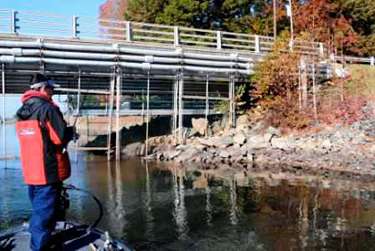
As winter approaches, many fishermen resign themselves to the armchair until spring. For lucky anglers who live near a hot water power plant lake, however, the water never freezes, and the fishing need never stop.
Power plant lakes, such as Lake Norman in North Carolina, provide year-round warm water bass fishing. Will Petty, an aspiring tournament professional and former Bassmaster Weekend Series Championship qualifier, calls the lake home. Preparing his boat for launch, Petty explained, "A hot water lake doubles as a cooling pond for power plants. The water around the discharge — or hot hole — is often 10 to 20 degrees warmer than in surrounding lakes. These areas harbor more forage, the bass are more aggressive, and they offer great fishing opportunities in the dead of winter."
Despite the frigid morning air, Petty put the boat on plane and headed to a barrier that prevents access to the plant. The water temperature here was 82 degrees.
"In the vicinity of the discharge," he said, throwing a buzzbait toward a school of spotted bass busting shad, "I look for current breaks, like points, stumps, dropoffs, bridge pilings, laydowns and current seams. In discharge lakes, there is a large volume of moving water. Outside of the hot hole, I fish ambush points like I would on any other lake."
Because power plants are drawing and releasing water, there is current flow all year. Find the best cover near the current, and that's where the dominant predators will be hiding. Since the current and cover near hot holes are sometimes community holes, finesse presentations such as the shaky head can be productive.
"Baits like Big Bite Squirrel Tail worms can be deadly. Flip it to the current break and let it drift past. A bass will inhale it as it passes, just like river fishing."
As more boats moved into the area, Petty picked up the trolling motor and started to idle away from the pack. He explained that one feature of a hot lake is that, "the influx of warm water affects most of the lake, not just the hot hole. The warmer water can influence fishing for miles. Find the right temperature and cover, find the fish." The cold morning air came with the promise of an Indian summer day as Petty pulled into a cove lined with docks. The water temperature here was 70 degrees. "It'll be time to shuck this coat soon," he said, grabbing a cranking combo and Spro Little John crankbait.
"When the pressure gets too great where I'm fishing, I just move out to areas with a little cooler water. Sometimes that's where the biggest bass are anyway. They'll bully the smaller bass away all year.
"Docks near deep water can be great, especially if you can locate the dredged docks with your graph, and deep docks can hold the best bass in a cove."
As he set the hook on a keeper, Petty offered another observation about hot lakes, "Because of the temperature difference, you can perfect different techniques all year. You can throw crankbaits in warm water or find water temperatures in the mid 40s to low 50s, where the baitfish are dying, and fish jerkbaits. There's no end to the possibilities."
Originally published December 2010




